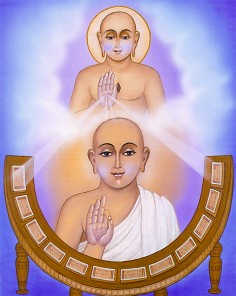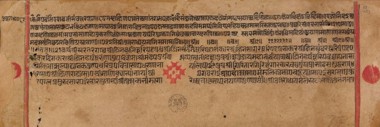Twenty-Fifth Lecture: The True Sacrifice
There was a famous Brāhmaṇa, Jayaghōṣa by name, who was born in a Brāhmanical family, but who was pledged to the performing of the yamas.[1] (1)
This great sage, who subdued all his senses, and who walked on the right road, came, on his wandering from village to village, to the town of Benares. (2)
There outside of Benares he took up his lodgings in a pleasant park; there he took up his abode in a pure place to live and sleep in. (3)
At the same time a Brāhmaṇa, versed in the Vēdas, Vijayaghōṣa by name, offered a sacrifice in that town. (4)
Now this houseless (monk) at the end of a fast of a month's duration, went to the sacrifice of Vijayaghōṣa to beg alms. (5)
The priest wanted to turn the approaching monk off: "I shall not give you alms, mendicant, beg somewhere else. (6)
"Priests who are versed in the Vēdas and are chaste as behoves offerors, who are versed in the Jyōtiṣāṅga[2] and are well grounded in the sacrificial science, who are able to save themselves. and others, such priests ought to be presented with food and all they desire." (7, 8)
When the great sage was thus refused by the priest, he was neither angry nor pleased, as he always strove for the highest good. (9)
Not to obtain food, or drink, or whatever else he wanted, but to save these people he spoke the following words: (10)
"You do not know what is most essential[3] in the Vēdas, nor in sacrifices, nor in the heavenly bodies,[4] nor in duties.[5] (11)
"Nor do you know those who are able to save themselves and others; but if you do, then speak out!" (12)
The priest did not make a reply to defend himself against his insinuation; but he and all there assembled joined their hands and questioned the great sage: (13)
"Tell us the most essential subject in the Vēdas, and tell us what is most essential in the sacrifice; tell us the first of the heavenly bodies, and tell us the best of dharmas. (14)
"Who are able to save themselves and others (viz. tell me). I ask you to solve this my doubt, O saint." (15)
"The most essential subject in the Vēdas is the agnihōtra, and that of the sacrifice is the purpose of the sacrifice;[6] the first of the heavenly bodies is the moon, and the best of dharmas is that of Kāśyapa (i.e. Riṣabha). (16)
"The beautiful (gods) with joined hands praise and worship the highest Lord (i.e. the Tīrthakara) as the planets, etc., (praise) the moon. (17)
"The ignorant (priests) pretend to know the sacrifice, those whose Brāhmanical excellence consists in (false) science; they shroud themselves in study and penance, being like fire covered by ashes. (18)
"He who is called by people a Brāhmaṇa and is worshipped like fire (is no true Brāhmaṇa). But him we call a true Brāhmaṇa, whom the wise point out as such. (19)
"He who has no worldly attachment after entering the order, who does not repent of having become a monk,[7] and who takes delight in the noble words, him we call a Brāhmaṇa. (20)
"He who is exempt from love, hatred, and fear, (and who shines forth) like burnished gold, purified in fire,[8] him we call a Brāhmaṇa. (21)
"A lean, self-subduing ascetic, who reduces his flesh and blood, who is pious and has reached Nirvāṇa, him we call a Brāhmaṇa. (22)
"He who thoroughly knows living beings, whether they move or not, and does not injure them in any of the three ways,[9] him we call a Brāhmaṇa. (23)
"He who does not speak untruth from anger or for fun, from greed or from fear, him we call a Brāhmaṇa. (24)
"He who does not take anything that is not given him, be it sentient or not sentient, small or large, him we call a Brāhmaṇa. (25)
"He who does not carnally love divine, human, or animal beings, in thoughts, words, or acts, him we call a Brāhmaṇa. (26)
"He who is not defiled by pleasures as a lotus growing in the water is not wetted by it, him we call a Brāhmaṇa. (27)
"He who is not greedy, who lives unknown, who has no house and no property, and who has no friendship with householders, him we call a Brāhmaṇa. (28)
"He who has given up his former connections (with his parents, etc.), with his kinsmen and relations, and who is not given to pleasure, him we call a Brāhmaṇa. (29)
"The binding of animals (to the sacrificial pole), all the Vēdas, and sacrifices, being causes of sin, cannot save the sinner; for his works (or Karman) are very powerful. (30)
"One does not become a Śramaṇa by the tonsure, nor a Brāhmaṇa by the sacred syllable Ōṃ, nor a Muni by living in the woods, nor a Tāpasa by wearing (clothes of) Kuśa-grass and bark. (31)
"One becomes a Śramaṇa by equanimity, a Brāhmaṇa by chastity, a Muni by knowledge, and a Tāpasa by penance. (32)
"By one's actions one becomes a Brāhmaṇa, or a Kṣatriya, or a Vaiśya, or a Śūdra. (33)
"The Enlightened One has declared these (good qualities) through which one becomes a (true) Snātaka;[10] him who is exempt from all Karman, we call a Brāhmaṇa. (34)
"The most excellent twice-born men[11] who possess these good qualities, are able to save themselves and others." (35)
When thus his doubt had been solved, Vijayaghōṣa, the Brāhmaṇa, assented[12] to the great sage Jayaghōṣa and to his (speech). (36)
Vijayaghōṣa, pleased, folded his hands and spoke as follows: "You have well declared to me what true Brāhmaṇahood consists in. (37)
"You are a sacrifice of sacrifices, you are the most learned of those who know the Vēdas, you know the Jyōtiṣāṅga, you know perfectly the Law. (38)
"You are able to save yourself and others; therefore do us the honour to accept our alms, O best of monks." (39)
"I do not want any alms; but, O Brāhmaṇa, enter the order at once, lest you should be drifted about on the dreadful ocean of the Saṃsāra, whose eddies are dangers. (40)
"There is glue (as it were) in pleasure: those who are not given to pleasure, are not soiled by it; those who love pleasures, must wander about in the Saṃsāra; those who do not, will be liberated. (41)
"If you take two clods of clay, one wet, the other dry, and fling them against the wall, the wet one will stick to it. (42)
"Thus foolish men, who love pleasure, will be fastened (to Karman), but the passionless will not, even as the dry clod of clay (does not stick to the wall)." (43)
When Vijayaghōṣa had learned the excellent Law from the houseless Jayaghōṣa, he entered the order. (44)
Jayaghōṣa and Vijayaghōṣa both annihilated their Karman by self-control and penance, and reached the highest perfection. (45)
Thus I say.
Yama etymologically means "restraint"; here it denotes the great vows of the Jainas; cf. XXIII, 12, p. 121 and note 2.
It is worthy of note that, according to the opinion of our author, the knowledge of astronomy, as taught in the Jyōtiṣa, was one Of the principal accomplishments of a priest. This quality of a priest must therefore have been more conspicuous to an outsider than Brāhmanical books would make us believe.
Jannaṭṭhī vēyasā muham = yajñārthī vedasām mukham. According to the Dīpikā sacrifice here means the ten virtues: truth, penance, content, patience, right conduct, simplicity, faith, constancy, not injuring anything, and Saṃvara.
According to the commentators we should translate: He who does not embrace (his people) on meeting them, and is not sorry on leaving them.
Niddhantamalapāvagaṃ. The commentator assumes a transposition of the members in this compound. Such irregular compounds are not unfrequented in our Prākṛt. If, however, pāvaga stands for pāpaka, the compound would be regular, and would prefer not to "gold," but to the person described. In that case we must translate: whose impurities and sins had been annihilated.
Snātaka denotes a Brahman who has finished his studies; it here means as much as "a perfect sage."
Samudāya tayaṃ taṃ tu. The text is evidently corrupted. Samudāya stands, according to the commentators, for samādāya, but there is no finite verb with which to construe the absolute participle, either expressed or easily supplied. Perhaps we must read samuvāya vayaṃ = samuvācha vachas; for the perfect is retained in some cases. However, if this conjecture be right, the next line would be superfluous.
 Ganadhar Sudharma Swami
Ganadhar Sudharma Swami
